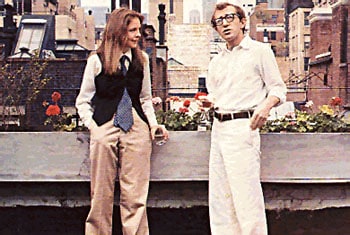Woody Allen is a genius. You can’t even say that he really is an American filmmaker, because his movies are in a category of their own. He started doing stand-up, and went on starring and directing in a bunch of screwball comedies. His most interesting work, though, is his many comedies about love and sex in New York. I believe he has made a film a year for the last 20 years or so. That’s an achievement, and you also have to appreciate how Woody succeeds at exploring the same things over and over.
The thing about this film is that it’s as genuinely funny as it is insightful. Allen pretty much always play the same character, but it’s such an interesting creation that you don’t get tired of it, kinda like Chaplin’s tramp. A character like Alvy Singer is obviously real close to the real Allen : a neurotic, intellectual yet shallow, pessimist yet funny Jewish comedian who whines a lot but doesn’t do much. He’s too busy complaining and fussing over details to realize that in the end, his life ain’t so bad. Like an older Jerry Seinfeld, he keeps ruining relationships with great women for the stupidest reasons. I mean, who wouldn’t be head over heels over “Annie Hall”? Diane Keaton, then best known for her supporting part in “The Godfather” flicks, was given the chance by Allen to really show how talented she really is. She plays a simple yet charming girl who comes to New York, wanting to become an actress or a singer, or whatever. She’s a bit clueless, but at least she’s enjoying life. The film has Allen trying to make her like him by buying her books about death, bringing her to foreign films and paying her visits to an analyst.
Like always, Allen doesn’t just tell us a love story that doesn’t quite work. It’s somehow just a frame with which he experiments, both in writing and direction. He really has a natural talent for dialogue. In a film like this, people don’t just recite lines from the script. More often than not, scenes feel like they’re filmed from real life. The thing about realistic dialogue is that it’s got to be imperfect. In life, you cut sentences, you jump from a thought to another, you interrupt… And most of Allen’s films are dialogue, and it always remains enjoyable, and often hilarious. There’s a great scene in which Annie and Alvy are trying to pick up live lobsters from the floor, and it doesn’t even feel like acting. Keaton and Allen are arguing and laughing totally convincingly.
Allen’s also an exceptional director who doesn’t take storytelling and visual conventions for granted. In Annie Hall, he’s always jumping around in chronology, using constantly flash-backs. There’s also a very interesting use of fantasy sequences that blend with real situations. For example, Woody recalls an annoying situation and we see his present self in the scene, talking to the camera about how he should have behaved. This probably is hard to understand, but you’ll see by watching the film. The American Film Institute ranks it as the 31st greatest film ever, and the Academy rewarded it with 4 Oscars. I don’t think that any of Allen’s other films have been hailed like that, even though most of his filmography is very interesting. But I can understand how Annie Hall touched people, probably because not only is it a masterpiece, it’s also terrific entertainment.

